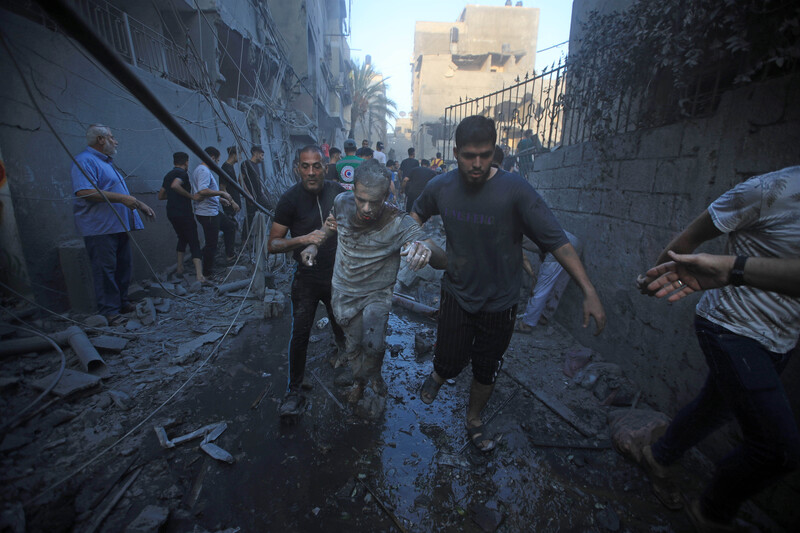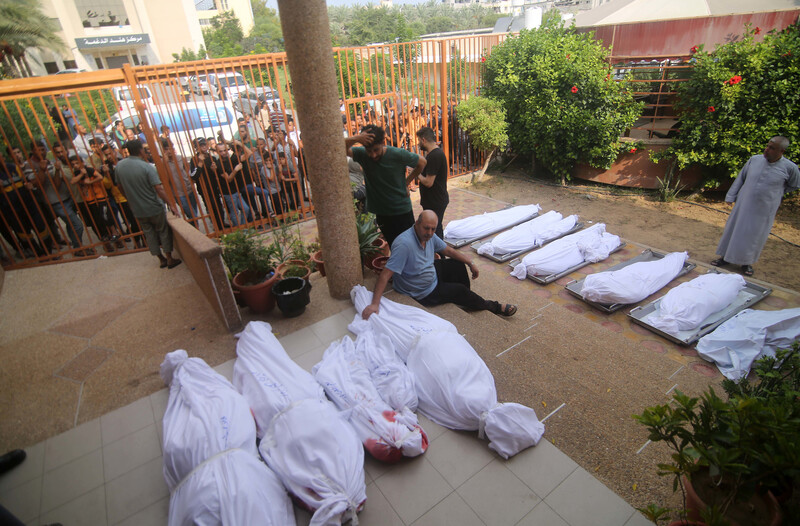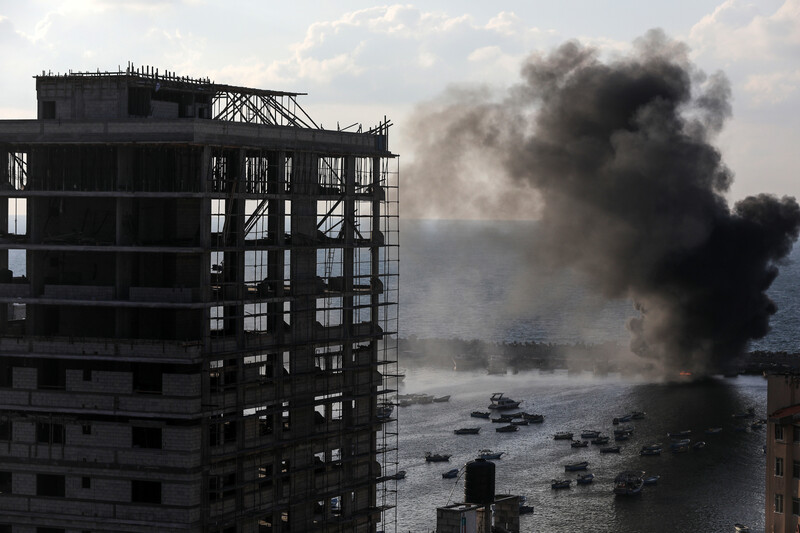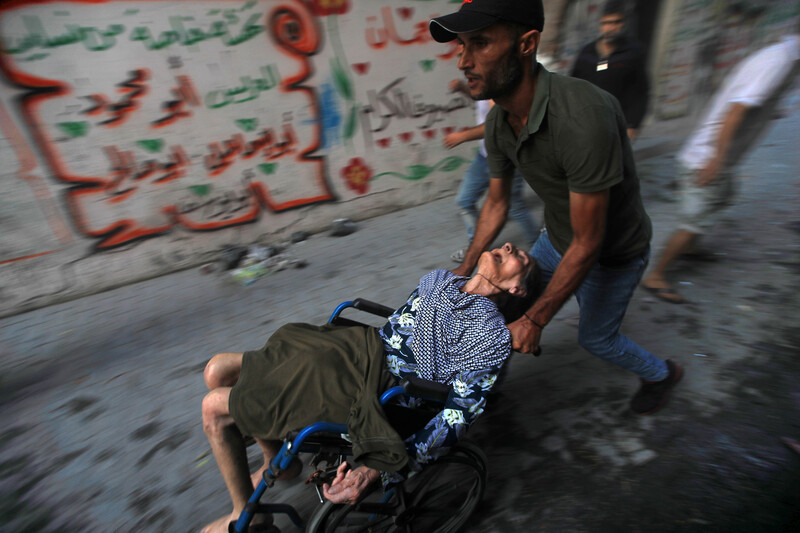Rights and Accountability 12 October 2023

Palestinians help an injured man evacuate after an Israeli airstrike on Gaza City on 11 October.
ActiveStillsIsraeli leaders declared total war on the Palestinian resistance organization Hamas on Wednesday.
“Every Hamas member is a dead man,” Prime Minister Benjamin Netanyahu said at a press conference shortly after forming an emergency war government with opposition leader Benny Gantz.
“Hamas is ISIS, and we will crush and eliminate it just as the world crushed and eliminated ISIS,” Netanyahu added.
But Israel’s actions on the ground were commensurate with a much broader war of revenge and extermination, targeting not just Hamas members but their families and the Palestinian people indiscriminately.
Israel’s relentless airstrikes in Gaza continued for a fifth consecutive day on Wednesday, after a surprise attack led by Hamas fighters from the territory on Saturday sparked the current, rapidly escalating crisis.
Late Tuesday an airstrike hit the family home of Muhammad Deif, the leader of Hamas’ military wing. Israel would have known there was little chance that Deif would be home, but the attack killed his father, brother and at least two other relatives in the southern town of Khan Younis, senior Hamas official Bassem Naim told the Associated Press.
By Wednesday evening, 1,100 Palestinians had been killed in Gaza, according to the territory’s health ministry. That number included 326 children, 171 women and 10 health workers. Twenty-eight families have been totally wiped out, typically when Israel bombs homes without warning, destroying them on top of their occupants.
More than 5,300 people in Gaza have been injured, one in five of them children.
Israeli media have given the unofficial figure of 1,200 dead in that country. Israel says it is holding the bodies of 1,500 Palestinian guerrillas killed since Saturday, though there has been no independent verification of that claim.
Palestinian resistance groups continued to fire volleys of missiles towards Israeli cities on Wednesday. Hamas’ military wing said it fired rockets towards Tel Aviv, Ashdod and Beersheva, in retaliation for Israel’s bombardment of civilians in Gaza.
Israel’s inability to suppress the continued rocket fire prompted three UK airlines to join the growing number of international carriers that have already suspended flights to Israel.
British Airways ordered a flight to Tel Aviv to turn around mid-journey and return to London.
“The move was influenced by the fact that sirens warning of a potential attack on Tel Aviv were going off as the diverted flight was approaching the Israeli city,” The Guardian reported.
The humanitarian situation was rapidly deteriorating for the 2.3 million Palestinians in the Gaza Strip, half of whom are children.
Al Mezan, a human rights group based in Gaza, said that after Israel cut off water, food and electricity to Gaza on Monday, with the territory’s sole power plant shutting down for lack of fuel on Wednesday, “the humanitarian crisis is worse than the carpet bombing.”
“We cannot escape the famine,” the rights group added, demanding an immediate opening of the besieged territory.
Ghassan Abu Sitta, a British-Palestinian surgeon in Gaza, described treating horrific injuries to children with very limited supplies: Defense for Children International-Palestine said on Wednesday said that it had confirmed that 105 Palestinian children in Gaza were killed “in direct Israeli attacks” since Saturday.The rights group said that the “intensive Israeli bombardment” throughout Gaza – as well as the lack of electricity and Israeli attacks on telecommunications infrastructure targeting two of the three main lines for mobile communication in the territory – have delayed its verification of the “unprecedented rate of daily child fatalities” recorded by the health ministry.
Palestinian human rights groups said on Wednesday that there were “significant killings and injuries among the civilian population, with many still trapped beneath the rubble, beyond the reach of search and rescue teams.”
The rights groups said that photos and video footage of Israeli strikes and other evidence from the ground indicate that the military may be using “white phosphorus and other internationally banned ammunition and weaponry … within densely populated civilian areas.”That and “other aspects of the current offensive will require the scrutiny of an international inquiry,” the groups added.
Overnight Tuesday, Israel concentrated its airstrikes on the al-Karameh neighborhood west of Jabaliya in northern Gaza, killing “a significant number of Palestinians such that our fieldworkers were unable to provide an accurate number as many people remain under the rubble, and are yet to be documented.”
The rights groups said that several Palestinians were killed in a strike targeting an ambulance during an evacuation of the wounded.
Twenty-four bodies were recovered from an area east of Jabaliya with many more under the rubble.

Palestinians gather in the courtyard of a morgue with the shrouded bodies of Palestinians killed in an Israeli airstrike in Khan Younis, southern Gaza Strip, on 11 October.
APA imagesAt least 57 Palestinians, including 20 children and 11 women, were killed in airstrikes and artillery and naval fire on Gaza City on Tuesday and Wednesday, destroying several residential buildings and targeting the Islamic University of Gaza.
In central Gaza, Israeli strikes hit the densely populated refugee camps of Bureij, Nuseirat and Deir al-Balah and attacked the Islamic National Bank among other targets including several homes.
“These attacks killed 49 Palestinians, including 15 children and 12 women; dozens were injured,” with others still under the rubble.
At least 43 Palestinians were killed in Khan Younis, including two members of Hamas’ political bureau, 16 children and 12 women.
In Rafah, southern Gaza, 16 Palestinians were killed, including four children, a woman and freelance photojournalist Mohamed Fayez Abu Matar, the seventh Palestinian journalist killed since Saturday, while international correspondents remain unable to enter the Gaza Strip.
The United Nations said that there were nearly 340,000 internally displaced people in Gaza as of Wednesday evening, with around two-thirds of them sheltering at 92 schools and other facilities run by UNRWA, the UN agency for Palestine refugees.Two UNRWA schools being used as emergency shelters were among 18 of its educational facilities hit since Saturday.
Eleven UNRWA staff members – five teachers, a gynecologist, an engineer and a psychological counselor and three support staff – have been killed since Saturday, the agency said.
Four paramedics with the Palestine Red Crescent Society were killed in the past 24 hours when an ambulance was targeted in northern Beit Hanoun. The World Health Organization has recorded 51 attacks resulting in 11 fatalities and 16 injuries among healthcare workers since Saturday. The UN said that several water and sewage facilities serving nearly half of Gaza’s population of 2.3 million were hit in Israeli airstrikes and severely damaged.“In some areas, sewage and solid waste are now accumulating in the streets, posing a health hazard.”
The UN warned of a “severe shortage of drinking water for over 650,000 people” in Gaza after Israel declared a total siege on the territory days earlier.
The lack of electricity for refrigeration and food cultivation, as well as Israeli strikes on poultry farms, the inability to access farms and decreasing food stocks amid price increases, was meanwhile negatively affecting food security in Gaza. Fishers have been unable to access the sea and on Tuesday, Israel bombed Gaza’s fishing port.
Gaza’s health ministry said that its facilities faced “severe shortages of medical supplies, damage from airstrikes, and extended electricity outages” while Beit Hanoun hospital was “inaccessible due to damage to surrounding areas,” according to the UN.White House spokesperson John Kirby said on Wednesday that the US was working with Israel and Egypt to secure a humanitarian corridor for civilians in Gaza.
There are fears that this would be used to facilitate a mass expulsion of Palestinians from the territory.On Wednesday, Adalah, a group that advocates for the rights of Palestinians in Israel, called for international intervention “to protect the lives of civilians in Gaza, most of whom are Palestinian refugees.”
The rights group added that Israel’s total war and siege on Gaza “violate international law.”
The group condemned “the unprecedented, brutal and illegal attack by Hamas militants in Israel against civilians.”
“While the Palestinian people are entitled to resist the Israeli brutal and prolonged occupation under international law,” Adalah said, “the killing of civilians, the holding of civilian hostages, and the holding bodies for any political purposes are completely prohibited means and constitute war crimes.”

Smoke billows after an Israeli strike on the port of Gaza City on 10 October.
NurPhotoAdalah said that Israel’s prolonged military occupation, the “killing of tens of thousands of Palestinians,” the blockade on Gaza since 2007 and settler-colonial policies in the West Bank, as well as “the denial of the inalienable right of the Palestinian people to self-determination” are the root causes of the current violence.
The rights group also pointed to “the total disregard by the international community of its obligations to fulfill UN resolutions.”
On Wednesday, the Qassam Brigades, the armed wing of Hamas, released a video recorded on Saturday that appears to show the release of a woman and two children along the Gaza-Israel boundary.
B’Tselem, an Israeli human rights organization that has condemned Israel’s total war and complete siege on Gaza, called for the immediate release of all captives held by Palestinians in the territory.It is believed that Palestinian fighters are currently holding 150 soldiers and civilians who were captured in settlements and military bases around the Gaza boundary on Saturday.
“Under no circumstances may civilians be used as bargaining chips,” B’Tselem said.
Multiple Israeli leaders have stated that the priority is a military campaign in Gaza rather than securing the release of captives held in the territory.
“This raises serious concern that Israel has no intention of working towards a deal and is willing to abandon the captives to their fate,” B’Tselem said.
Physicians for Human Rights Israel stated that it was “difficult to witness” how the “severe agony” experienced by the Israeli public after the attack on Saturday “is currently being used to justify the indiscriminate bombardment of residential neighborhoods and the complete disregard of international conventions.”

An older woman is evacuated in a wheelchair following an Israeli airstrike in Gaza City on 11 October.
ActiveStills“Revenge is not a political plan of action and will not yield any solution. Efforts must now be concentrated on negotiating a deal for the peaceful release of the abducted,” the rights group added.
An Israeli military spokesperson said on Wednesday that there were no new instances of infiltration from Gaza over the past two days and said that the guerrillas who attacked on Saturday “intended to occupy the area, not raid and return to Gaza.”
The Israeli military said on Wednesday that it was continuing to comb settlements along the Gaza boundary and that sporadic fighting with remaining guerrillas was ongoing.
The Times of Israel, citing the Israeli military, said that in one incident in recent days, Palestinian guerrillas “wearing Israeli army uniforms opened fire at troops” before being shelled and killed in Kibbutz Be’eri.
An Israeli military commander said that battles with Palestinian guerrillas in Kibbutz Be’eri and Re’im “were very difficult battles, most of them as terrorists fortified themselves against forces that tried to break in. We sustained several wounded and dead.”
Lebanon
Tensions remained high on the northern front, with continued deadly exchanges of fire across the border between Lebanon and Israel.
Hizballah said it fired guided missiles at an Israeli military post across the border early Wednesday as a “firm response” to Israeli fire on Monday that killed three members of the Lebanese resistance group.
The missiles caused “confirmed casualties,” according to Hizballah, including deaths and injuries. Hizballah published a video of the strike showing two men, presumably Israeli soldiers, on a hill overlooking a border wall.
A missile appears to hit their location directly, causing a huge explosion.
Hizballah reaffirmed that it would remain “decisive in its response” to Israeli attacks.The Israeli military “said it carried out strikes in Lebanon in response to the attack but did not immediately provide information on casualties,” according to The Times of Israel.
On Monday, a senior Israeli officer and two soldiers were killed in a firefight with three members of the Palestinian Islamic Jihad resistance organization who infiltrated across the border from Lebanon.
The Israeli military claimed it killed two of the men while a third returned to Lebanon.
Underlining the fears that these incidents could spiral into a full-blown conflict, millions of residents of northern Israel were ordered to bomb shelters amid reports of a massive drone attack coming from the north. The Israeli army later admitted it was a false alarm.
“Local media outlets breathlessly reported of manned drones and paragliders crossing the border, with some TV reporters claiming to hear explosions and something striking the ground in the border town of Metula,” according to The Times of Israel. “Footage on Channel 12 news appeared to show a drone moving across the sky, though it was later revealed to have been an Israeli craft.”
Aside from the alarming prospect that such reports could unintentionally trigger a wider conflict, they were a further sign of the wide prevalence of disinformation and lies.
Also on Wednesday, the Qassam Brigades, the military wing of Hamas, said it targeted the northern city of Haifa with a long-range R160 missile. There were “no immediate reports of casualties after sirens sounded in Haifa and nearby towns,” according to Reuters.
Ali Abunimah contributed reporting.





